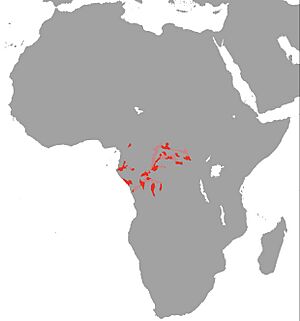Spotted lungfish facts for kids
Quick facts for kids Spotted lungfish |
|
|---|---|
 |
|
| Conservation status | |
| Scientific classification |
|
| Kingdom: | Animalia |
| Phylum: | Chordata |
| Order: | Dipnoi |
| Order: | Ceratodontiformes |
| Family: | Protopteridae |
| Genus: | Protopterus |
| Species: |
P. dolloi
|
| Binomial name | |
| Protopterus dolloi Boulenger, 1900
|
|
 |
|
| Script error: The function "autoWithCaption" does not exist. | |
Script error: No such module "Check for conflicting parameters".
The spotted lungfish is also known as the slender lungfish. Its scientific name is Protopterus dolloi. This unique fish lives in the rivers of Middle Africa. You can find it in the Congo, Kouilou-Niari, and Ogowe river basins. It's one of four types of lungfish in the Protopterus family that are still alive today.
Where the Spotted Lungfish Lives
The slender lungfish is a freshwater fish. This means it lives in rivers and lakes, not the ocean. It mostly lives in the middle and lower parts of the Congo River basin.
This fish usually stays near the bottom of rivers. It likes to live in the riverbeds of the Congo, Kouilou-Niari, and Ogowe basins. It also lives in a large lake-like area called Stanley Pool.
During the time when they lay eggs, female lungfish might swim out into the open water.
Amazing Facts About the Spotted Lungfish
The slender lungfish has a body shape much like an eel. This means it is long and snake-like. Young lungfish often have black spots all over their bodies.
However, as they grow older, these spots usually fade away. Adult lungfish tend to be a plain brown color.
Like all African lungfish, the slender lungfish must breathe air. It cannot get all its oxygen from the water. This fish can also go into a special sleep called aestivation.
Aestivation is like hibernation, but it happens in hot, dry times. The lungfish usually does not need to aestivate. But if it does, it makes a dry, slimy cocoon on land. This cocoon helps it stay safe and moist.
When fish are on land, they can have problems with a waste product called ammonia. Most tropical fish get rid of ammonia in the water. But the slender lungfish has a special way to deal with this.
It can make less ammonia inside its body. It also has a special process that changes ammonia into a less harmful substance called urea. This helps the lungfish survive when it is out of water.
Spotted Lungfish Reproduction
Spotted lungfish usually build their nests between June and October. The male lungfish is responsible for making the nest. He digs a nest in the mud at the bottom of the river.
This is similar to how the marbled lungfish mates. The male lungfish then guards both the eggs and the young fish. He stays with them until they are ready to swim on their own.
The female lungfish does not help care for the young. During this time, she can be found swimming in the open water of the rivers.
 | Ernest Everett Just |
 | Mary Jackson |
 | Emmett Chappelle |
 | Marie Maynard Daly |


